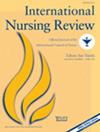Workplace Violence, Normalization of Violence, and Psychological Distress Among Korean Nurses: A Cross-Sectional Analytic Study
Abstract
Aim
To investigate the prevalence and normalization of workplace violence, identify associated risk factors, and compare psychological distress levels based on experiences of workplace violence and its normalization among nurses during the COVID-19 pandemic.
Background
Workplace violence against nurses has increased during the pandemic, exacerbating their psychological distress.
Methods
A cross-sectional analytical study was conducted using online convenience sampling to recruit 325 Korean nurses. Data were collected via an online survey assessing demographic and occupational characteristics, workplace violence, normalization of violence, and psychological distress. Descriptive statistics, independent t-tests, and multiple logistic and hierarchical logistic regression analyses were employed. The study adhered to the STROBE guidelines.
Results
Among the 308 nurses surveyed, 30% reported experiencing workplace violence, and 29% indicated normalizing such incidents. Significant risk factors included prior victimization, normalization of violence, and perceived effectiveness of workplace COVID-19 prevention measures. Among nurses who experienced workplace violence, those who normalized it reported lower levels of psychological distress than those who did not. Conversely, among those without such experiences, individuals who normalized workplace violence reported higher levels of psychological distress than those who did not.
Conclusions
Workplace violence remains prevalent during infectious disease outbreaks, with a substantial proportion of nurses normalizing these experiences. This normalization is associated with distinct patterns of psychological distress, underscoring the need for increased awareness and the provision of tailored psychological support. Enhancing workplace safety measures is essential to protecting nursing well-being.
Implications for nursing and health policy
Health administrators and policymakers should prioritize the implementation of strategies that address the occurrence and normalization of workplace violence. Investing in mental health services and fostering organizational cultures that actively respond to workplace violence are crucial.


 求助内容:
求助内容: 应助结果提醒方式:
应助结果提醒方式:


